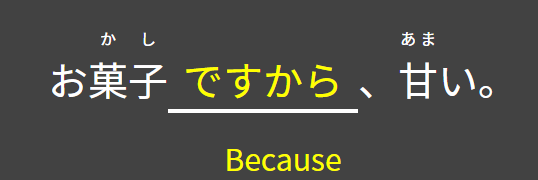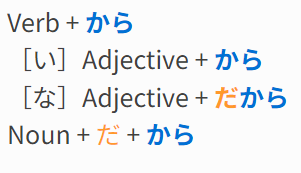because・since
Structure
- Verb + から
- いAdjective + から
- Noun + だから
- なAdjective + だから
[から can mark subjective or objective causes/reasons while ので marks objective ones・emphasis on the cause]

because・since
Structure
- Verb + から
- いAdjective + から
- Noun + だから
- なAdjective + だから
[から can mark subjective or objective causes/reasons while ので marks objective ones・emphasis on the cause]

I think I’ve read somewhere that if you’re using the polite form in multiple main clauses, the politness-level has to agree. (Feel free to correct me/add to that, I don’t think I really understand what a main clause is yet °-°)
So wouldn’t “ですから” be wrong unless it’s “あまいです” ?
In Genki, this is first introduced in chapter 5 where it provides the structure:
(1) バスに乗りましょう。タクシーは高いですから。
However, in DBJG, paragraph 1 says:
“[…] in Japanese, kara clauses always precede the main clause.”
So the example Genki gives should be タクシーは高いから、バスに乗りましょう。
Can someone help me reconcile this?
Hello, one of the context sentences is:
スポーツをしたから、暑いです。
Which translates to: Because I played sports, I am hot.
Does it refer to body temperature, or to body sexiness?
@Daigo
Hey 
This word is not used to indicate body sexiness (there are other words like セクシー or エロい).
In this sentence it refers to body, evokes image of swearing a lot.
Cheers!
In kanzen master they have the structure like 〜からです to be used at the end of a sentence like
スピーチが上手にできませんでした。れんしゅうが足りなかったからです。
But I could not find any examples of this usage in Bunpro. Should I consider it the same as this grammar or is it somewhere else?
Hey!
This is the same grammar point as this one, but used at the end of a sentence. スピーチが上手にできませんでした。れんしゅうが足りなかったからです。and れんしゅうが足りなかったから、スピーチが上手にできませんでした。has the same meaning.
That may be a stupid question, but…
How to diffrientiate から as a sentence conjuction from any other conjunction particles?
I am always messing my reviews with all that が、から、けど、etc.
Hey and welcome to the community!
From the examples that you gave, が and けど both essentially mean the same thing (but), but the former is more formal than the latter. If you answer either of them on the other’s review, you should get a ‘Can you say it another way?’ message so you can fix it without having an incorrect review.
から has a different meaning altogether; it means ‘because’, so if you answer by one of the examples you gave, that would be marked as incorrect, basically because it is. Are you getting reviews marked as incorrect for other things that have basically the same meaning (because)? If so, you can either fill out a feedback request while doing your reviews, or pop a message here.
Hope this helps 
Shouldn’t this answer be marked as incorrect, for the same reason that @xBl4ck pointed out above? (行く being used as opposed to 行きます)
By the way, the grammar point mentions the だ+から-construction in the structure section, but the です+から-construction is not mentioned here. (There is no ‘formal’ tab.) ですから is included in the example sentences, so shouldn’t it also be included in the structure section?
As someone else who recently came across this usage in the wild (i.e. Sentence One. Explanatory Sentence Two ending in から.), I feel like it’d be nice if this were mentioned in the grammar point / shown in an example sentence or two. Just an “icing on the cake” suggestion!
I’m a bit confused with this as well - I got the sentence with おいしい and だから is not allowed, but ですから is. Please can you explain why the latter is permissable?
い-adjectives can’t be followed by a copula like that. です is special because it can be used as a “politeness particle” too that has no grammatical function. Because the sentence ends with a verb in -ます form and is therefore a polite sentence, it’s possible, but not necessary, to also make the part before から polite.
Hi, I still don’t really understand the だ part in だから
You have to add it after a na-adjective or after a noun.
What does the だ actually mean?

This is an example sentences from だから in the vocabulary deck.
Why do you have to add a だ there even when it is a new sentence?
Maybe someone can explain the concept to me. I have the same questions about けど and だけど What does the だ part actually add to the sentences. Is it some kind of だ like です?
Hey @MikkaT !
The だ used here and in けど is this. The reason that だ needs to be added after nouns and adjectives are the same reason you need to add ‘is’ in English.
For example, 大きい会社だから、人がたくさんいる (natural) VS 大きい会社から人がたくさんいる (unnatural) is the same as comparing ‘Because it is a big company, there are a lot of workers’ VS ‘Because big company, there are a lot of workers’.
Although they may look the same, だから, in the vocabulary section is a conjunction (接続詞), and だ+から is a case marking particle (格助詞). This means that だから is used to connect the first sentence and the second sentence like in the image you have attached. This is kind of similar to how grammar points like しかし is used!
I hope that answers your question! 
Hi, yes that makes it a bit clearer. Thank you. 
What is the difference between the following quiz answers?
I assume だから is less polite than the others, but then what’s the difference between ですから and だからです? Are they basically equivalent? Are there situations where I should prefer one over the other?